The Church commemorates today the Synaxis for the archangels, Michael and Gabriel, and all the bodiless powers of heaven.
“The role of angels, or spiritual powers, is evident from their appearance in both the old and the new testament. St Paul says: “They are all spirits, whose work is service, sent to help those who will be the heirs of salvation.”
“While the Church honors these divine ministers as guardians and messengers each Monday, today we feast especially Michael and Gabriel. Michael, whose name means “one like God,” was revered in the Old testament. In the book of Revelation he is depicted as the captain of the angelic army” (NS).
James Michael Thompson writes of today’s feast: “The Synaxis of the Chief of the Heavenly Hosts, Archangel Michael and the Other Heavenly Bodiless Powers: Archangels Gabriel, Raphael, Uriel, Selaphiel, Jehudiel, Barachiel, and Jeremiel was established at the beginning of the fourth century at the Council of Laodicea, which met several years before the First Ecumenical Council. The 35th Canon of the Council of Laodicea condemned and denounced as heretical the worship of angels as gods and rulers of the world, but affirmed their proper veneration.
A Feastday was established in November, the ninth month after March (with which the year began in ancient times) since there are Nine Ranks of Angels. The eighth day of the month was chosen for the Synaxis of all the Bodiless Powers of Heaven since the Day of the Dread Last Judgment is called the Eighth Day by the holy Fathers. After the end of this age (characterized by its seven days of Creation) will come the Eighth Day, and then “the Son of Man shall come in His Glory and all the holy Angels with Him” (Mt. 25:31).”
Commanders of the heavenly hosts,
we who are unworthy beseech you,
by your prayers encompass us
beneath the wings of your immaterial glory,
and faithfully preserve us who fall down and cry to you:
“Deliver us from all harm,
for you are the commanders of the powers on high!” –Troparion – Tone 4
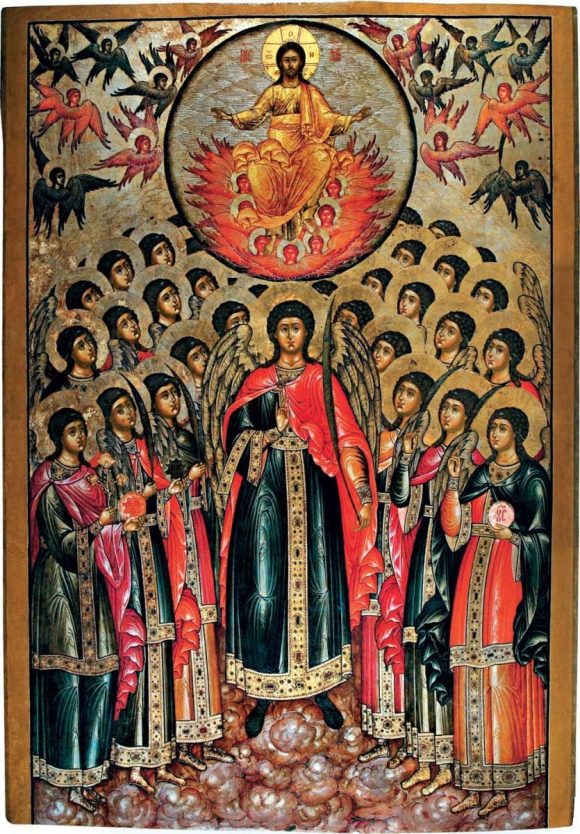
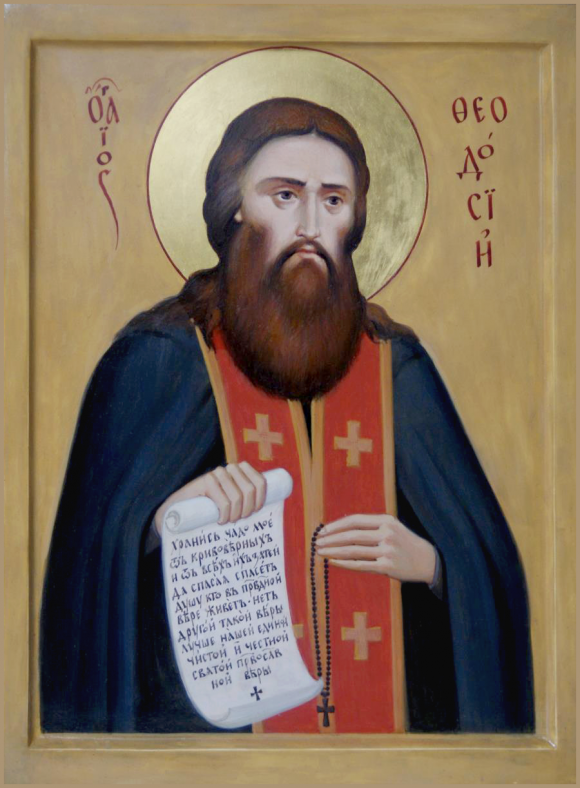
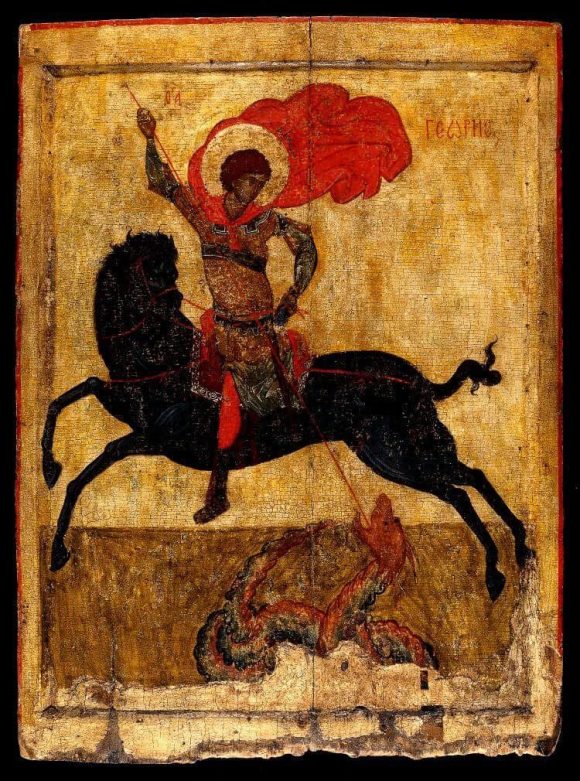
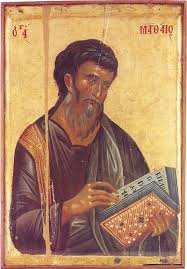 At the beginning of the Fast before Christmas, we celebrate the feast of St. Matthew, who wrote one of the Gospels of the birth of our Lord. (St. Luke is the other.) St. Matthew’s purpose was to show how the prophecies of the Covenant were fulfilled in Jesus. Therefore, he is the son of Abraham and the Son of David. He fulfills the prophecy of Isaiah that a virgin would give birth, the prophecy of Micah that he would be born in Bethlehem, the prophecy of Jeremiah that the innocents would die, and that he would be called a Nazorean. Matthew tells us of the visit of the Magi, the massacre of the innocents, and the flight into Egypt. It is also Matthew who presents to us the model figure of St. Joseph. Just as the Joseph of the Old Testament saved his people in Egypt, so the Joseph of the New Testament saves the hope of the people, Jesus, by taking him to Egypt. We have no better model of human fatherhood. Joseph is a righteous man (Matthew 1:19), who is open to God’s revelation through his messenger angel that the child of Mary is of God, a faith that goes beyond human knowledge. It is Joseph who protects the child, his foster son, so that Jesus, the Savior, could someday fulfill the plan of the heavenly Father. It is Joseph who re-orders his whole life for the sake of his beloved child. Joseph, then, is a model of divine fatherhood, “from whom every fatherhood in heaven and on earth is named. (Ephesians 3:15)”
At the beginning of the Fast before Christmas, we celebrate the feast of St. Matthew, who wrote one of the Gospels of the birth of our Lord. (St. Luke is the other.) St. Matthew’s purpose was to show how the prophecies of the Covenant were fulfilled in Jesus. Therefore, he is the son of Abraham and the Son of David. He fulfills the prophecy of Isaiah that a virgin would give birth, the prophecy of Micah that he would be born in Bethlehem, the prophecy of Jeremiah that the innocents would die, and that he would be called a Nazorean. Matthew tells us of the visit of the Magi, the massacre of the innocents, and the flight into Egypt. It is also Matthew who presents to us the model figure of St. Joseph. Just as the Joseph of the Old Testament saved his people in Egypt, so the Joseph of the New Testament saves the hope of the people, Jesus, by taking him to Egypt. We have no better model of human fatherhood. Joseph is a righteous man (Matthew 1:19), who is open to God’s revelation through his messenger angel that the child of Mary is of God, a faith that goes beyond human knowledge. It is Joseph who protects the child, his foster son, so that Jesus, the Savior, could someday fulfill the plan of the heavenly Father. It is Joseph who re-orders his whole life for the sake of his beloved child. Joseph, then, is a model of divine fatherhood, “from whom every fatherhood in heaven and on earth is named. (Ephesians 3:15)”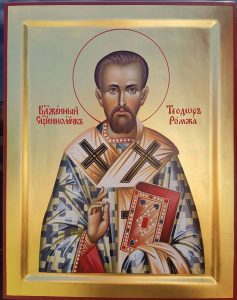
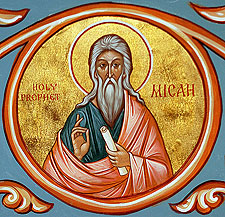 Today, on the Vigil of the Dormition, the commemorates the memory of the holy prophet, Micah.
Today, on the Vigil of the Dormition, the commemorates the memory of the holy prophet, Micah.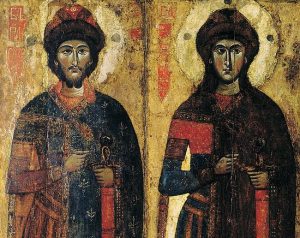 Our Church liturgically commemorates the holy protomartyrs of Rus’, Boris and Gleb, in baptism named Roman and David.
Our Church liturgically commemorates the holy protomartyrs of Rus’, Boris and Gleb, in baptism named Roman and David.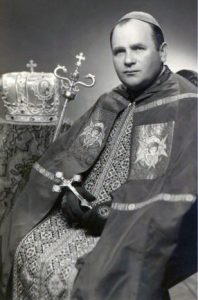 The Byzantine Church recalls the memory of a 20th century martyr for the faith, Basil Hopko (April 24, 1904—July 23, 1976) was a priest and bishop of the Slovak Greek Catholic Church. Hopko was beatified by Pope John Paul II for his martyrdom under Communist occupation.
The Byzantine Church recalls the memory of a 20th century martyr for the faith, Basil Hopko (April 24, 1904—July 23, 1976) was a priest and bishop of the Slovak Greek Catholic Church. Hopko was beatified by Pope John Paul II for his martyrdom under Communist occupation.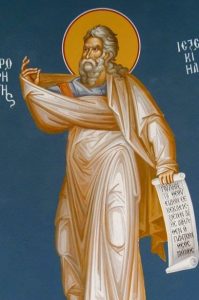 The holy prophet Ezekiel is commemorated today.
The holy prophet Ezekiel is commemorated today.